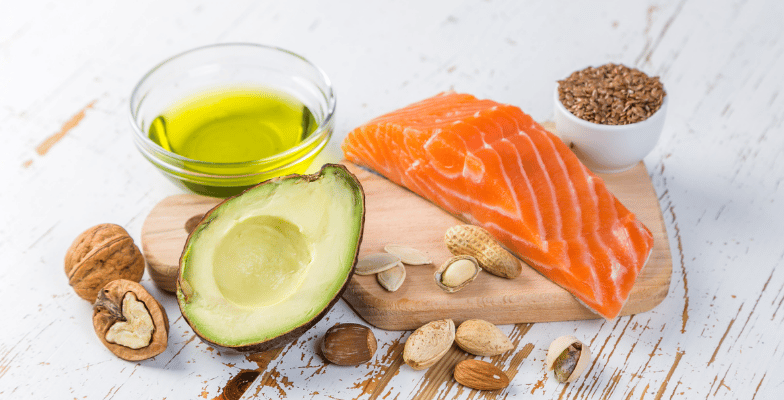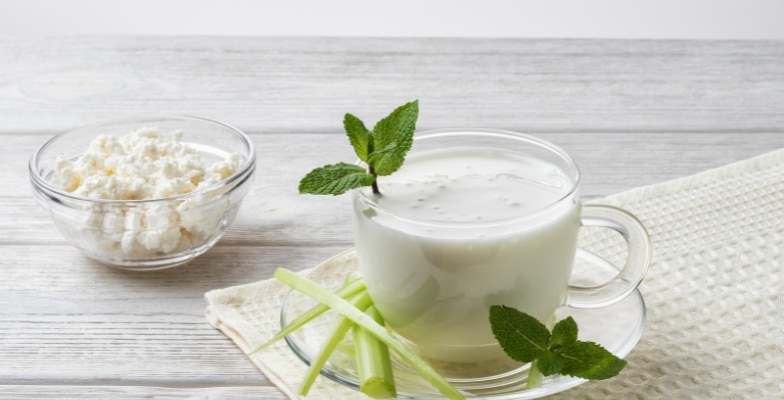5 Functions Of Fat In The Diet

Does fat make you fat? Contrary to popular belief, the answer is No.
Then, why on earth does fat have such a bad reputation? To answer this question, we must consider the quality and quantity of fat consumed. Examining these two factors will be enough to clear the blame.
Unfortunately, many of us are not aware of the benefits of fat and its importance in our daily diet. Fortunately, this information is neither complicated nor hard to access. We need to understand the difference between good fat and bad fat and how to incorporate more healthy fat into our diets.
Along with proteins and carbohydrates, fats are essential macronutrients.
Related Articles:
Good Fat Vs. Bad Fat | Complete List And Chart
Good Carbs Vs. Bad Carbs | Complete List
Every gram of fat provides about 9 calories, whereas proteins and carbohydrates contain 4 calories/gram.
Types Of Fat
There Are Two Types Of Fats(The Good Ones!), Saturated And Unsaturated
Saturated Fat
An excellent way to remember the difference between saturated and unsaturated fats is that saturated fats are solid at room temperature.
A common belief is that a diet high in saturated fat can raise LDL cholesterol and increase the risk of heart disease. The American Heart Association (AHA) recommends the average adult should not consume more than 13g of saturated fat per day.
However, I like to believe that saturated fats are unfairly demonized! Recent studies have proven that saturated fat may not be so unhealthy after all!
Foods that contain saturated fats are butter, ghee, coconut oil, red meat, palm oil, etc.
Related Article: Saturated Fat: Good Or Bad?
Unsaturated Fats
Unsaturated fats, which are monounsaturated and polyunsaturated, are liquid at room temperature and mostly obtained from plants.
Monounsaturated fats reduce LDL or bad cholesterol and increase HDL or good cholesterol. Foods rich in monounsaturated fats include nuts, seeds, olives, avocados, and oils like olive oil.
Polyunsaturated fats include essential fatty acids like omega-3 and omega-6, which are critical for the proper functioning of our body. Consuming omega-6 and omega-3 in an optimal ratio reduces blood pressure, increases HDL, lowers triglycerides, and reduces chronic inflammation.
Walnuts, flaxseeds, and fish are good sources of omega-3. 1https://www.heart.org/en/healthy-living/healthy-eating/eat-smart/fats/monounsaturated-fats, 2https://www.heart.org/en/healthy-living/healthy-eating/eat-smart/fats/polyunsaturated-fats
Related Article: Unsaturated Fats: Good Or Bad?
(This article also discusses why it is crucial to limit or avoid vegetable oils to maintain an optimal ratio of omega-3 to omega-6 fats.)
Trans Fat
This type of fat is manmade, unhealthy, and non-essential. Trans fats have become popular in the last couple of decades as they are cheap to produce and enhance food flavor. They are used in processed foods as they significantly increase shelf life.
These fats are terrible for our health, especially our heart, as they do the opposite of healthy fats- they raise bad cholesterol (LDL) and lower good cholesterol (HDL). 3https://www.heart.org/en/health-topics/cholesterol/prevention-and-treatment-of-high-cholesterol-hyperlipidemia/the-skinny-on-fat
I believe dietary fats, like other macronutrients, are an essential part of a balanced diet as they have many crucial functions in the human body.
Popular snacks like french fries, doughnuts, pastries, cookies, crackers, and pies contain trans fats.
Let’s now discuss the 5 functions of fat.
5 Functions Of Fat
1) Forms The Structural Component Of Cells
The membranes of each cell are composed of protein and lipids, including phospholipids, cholesterol, and triglycerides. The cell membrane acts as a barrier between the inside of the cell and the outside environment, controlling the movement of substances in and out of the cell.
Our brain is ~60% lipids, with DHA (a type of omega-3 fatty acid) being the most prominent. 4https://www.researchgate.net/publication/42438067_Essential_fatty_acids_and_human_brain The retina of the eyes also contains DHA. 5https://www.ncbi.nlm.nih.gov/pmc/articles/PMC3206354/#:~:text=The%20retina%20has%20a%20high,antiapoptotic%2C%20role%20in%20the%20retina These facts underline the importance of including optimal levels of both EPA and DHA in one’s diet.
2) Source Of Energy
Together with carbohydrates, fats are a primary source of energy. Fat is a dense source, providing nine calories per gram consumed. Fats stored in the body as adipose tissue are released as fatty acid as required. 6https://pubmed.ncbi.nlm.nih.gov/26177664/
3) Absorption Of Fat-Soluble Vitamins
Vitamins A, D, E, and K are fat-soluble vitamins, which means our body needs enough fat to absorb them.
Vitamin A is essential for healthy eyes, teeth, and skin; vitamin D promotes healthy eyes and bones and boosts the immune system. Vitamin E is a powerful antioxidant that helps build our immunity, and vitamin K helps blood clot and builds bone tissue.
Without enough fat in the diet, the body cannot absorb these crucial vitamins. 7https://www.ncbi.nlm.nih.gov/pubmed/25441954
4) Insulates & Protects The Body
Fat cells stored in adipose tissue insulate our body and protect it from extreme cold and heat. Visceral fat (fat around our organs) protects our heart, kidney, and liver.
The extra padding of fat on our hands, legs, and buttocks helps in physical activities like swimming, running, and other sports. It also protects us from physical trauma. However, this does not mean we should be overweight. Excess body fat can cause a lot of medical problems.
Related Article: Ideal Body Fat Percentage For Men
5) Increases Satiety
Meals cooked in healthy fat like ghee or coconut oil have a lot of flavor and taste, but they also help us feel more satiated. For example, if you eat this for breakfast, there is a high probability that you won’t feel hungry for at least 5-6 hours!
Related Articles:
Fats take longer to digest and absorb, thereby increasing satiety, which helps us stay on track with our weight loss goals!
Conclusion & My Recommendation
The first thing you should do is make a conscious effort to improve the fat you consume.
-Focus on including saturated fats like ghee and coconut oil in your diet.
-You should start using these oils as your primary cooking oils.
-Next, increase the quantity of good fat you consume. Eat at least 30% of your total calories from healthy fats!
-Do not throw away your egg yolk, and drink whole cow’s milk.
-Add nuts like walnuts and almonds to your diet.
-Adding a tbsp of extra virgin olive oil or 15g of flaxseed oil to your salads can quickly satisfy your omega-3 requirement.
Related Articles:
Is Egg Good For Health? | How Many Eggs Can I Eat In A Day?
Benefits Of Walnuts | How Many Walnuts Should You Eat Per Day?
Almonds Benefits For Health | How Many Almonds In A Day?
Omega 3 Fatty Acids Benefits And Daily Requirement
What do you think about this article? Have any questions? Let me know in the comments below!

Skill-Based Education.
Global Recognition.
Powerful Community Building
Secure a certificate of completion in as little as a day by graduating from one of our free courses.
Get Access to Our Free Courses. No Credit Card Required.

Fabulous Body Membership
Your All-Access Pass to A Fabulous Body & A Rewarding Career
25+ Certificate Courses & Programs, All Included
15 Day Free Trial, 100% Money-Back Guarantee
About Kamini Thakar
Kamini is a very skilled writer/content creator. As a part of Fabulous Body for years, she has authored many articles really proving her prowess in acquiring and presenting knowledge about various health & nutrition topics.











Kamini Chugh has given very relevant information. The article is very informative and makes one aware of all the nutritional facts.
Kamini ji you are given very good information.
Very informitive..keep it up! 🙂
Great article!
Thanks!
Thanks Nishi
Thanks Anu karha
Thanks Rohit